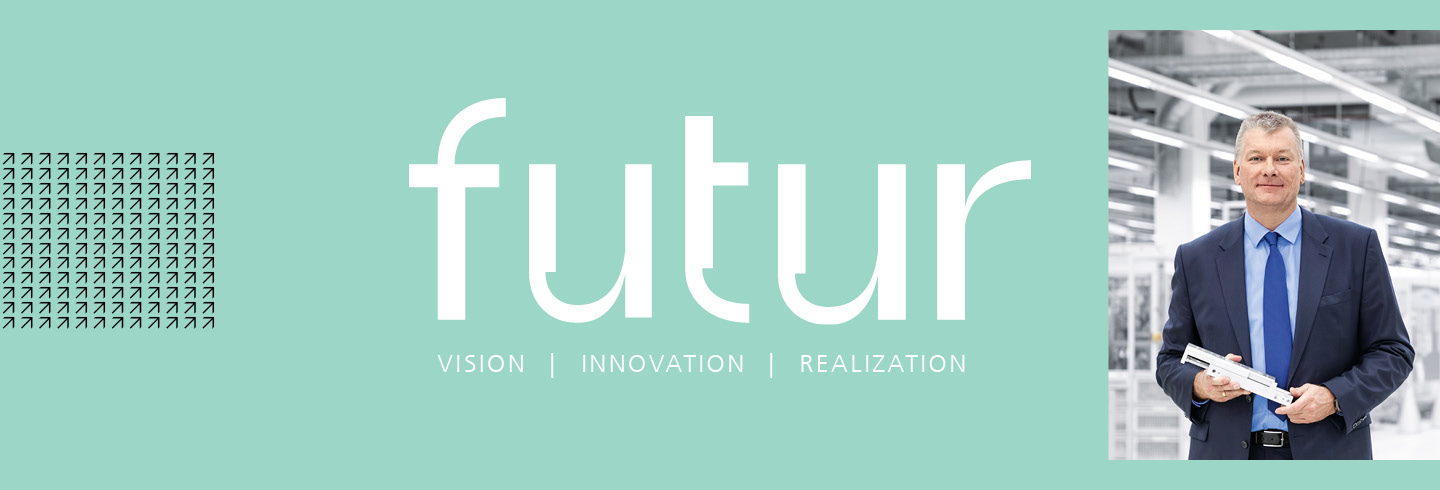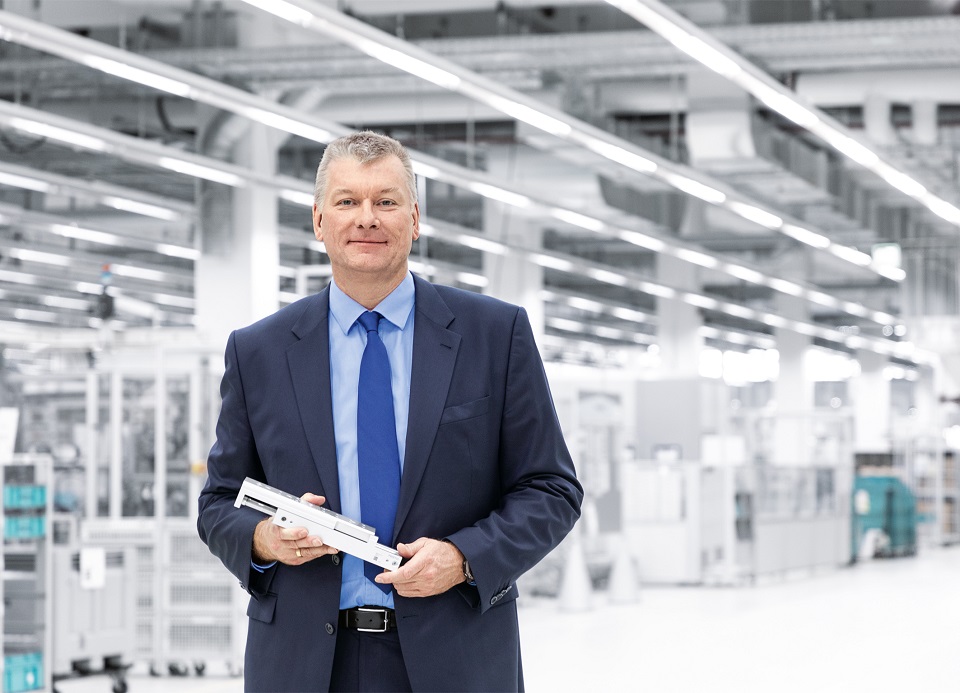Our Goal Is to Provide the Best Solution for Applications and the Environment
futur: Your company website states that Festo »thinks in terms of generations, not business years«. How does this play out in your company strategy?
Kriwet:
In our current company strategy, we phrased the claim we make about ourselves as »Progress in Motion«. This is what drives us. With our expertise in automation and technical education, we support our customers in increasing their productivity while also creating free space for sustainable development of the environment, the economy and society.
This maxim holds true for all our colleagues at Festo throughout the world. What we mean by sustainability is not just protecting the climate, but also health and safety, along with technical education as a vital pillar for our future. Festo founded Festo Didactic back in the 1950s with the aim of giving people lifelong learning and opportunity to develop their technical capabilities. Digitalization is offering many new opportunities and chances.
For Industry 4.0 to succeed, training and qualification of skilled professionals must be tailored to the new needs of digital production. Festo Didactic pours its extensive practical experience in the area of digital production into bespoke learning programs, modules and content to ensure that skilled workers and up and coming young professionals are well prepared for their new roles in the smart factory, and to meet the requirements of Industry 4.0.
futur: One might think that as head of sales, you would be most concerned with sales figures and sales markets. What kind of influence do issues of sustainability have on your work?
Kriwet:
A huge one. Sustainability is playing an increasingly important role, not just for us but for our customers as well. As a B2B company, we are a traditional supplier to a large range of industries – from the automotive, foodstuffs and packaging industries through to the LifeTech sector, the electronics industry and process automation. So we must consider the entire lifecycle of our products and not just look to ourselves. Our goal is to provide the best solution for applications and the environment. Smart products for smart solutions mean more productivity for our customers and greater prosperity for the world, along with a considerate approach to the environment.
We are constantly generating information and knowledge from data. We are using this new resource to achieve the highest quality standards, a self-optimizing production, a maximum level of flexibility and minimal use of resources in our own factories and those of our customers. AI has now arrived in industrial practice. Festo already deploys AI in its product range, where it is working together with human expertise on the most highly complex system data to identify the ideal pressure points for self-learning optimization, guaranteeing even greater overall equipment effectiveness for our customers.
Here are some other examples: With its Digital Administration Shell Festo is offering a standardized, semantic and technical digital »packaging« for workpieces and components that enables manufacturer-independent interaction in digital ecosystems. Or take interoperable models for documentation, certificates, software, data sheets, 3D, EPLAN and AutomationML such as the digital type plate that will make paper manuals and operating instructions obsolete.
futur: A sparing use of resources is part of sustainable company management. How do you achieve this specifically?
Kriwet:
Our products and solutions are the greatest levers for reducing global CO2 emissions. We support our customers on their way to CO2-neutral production with smart products and comprehensive consulting to improve their energy efficiency. This is why we intend to significantly extend the scope of this approach.
There already are some current examples in our product portfolio: With the Festo Motion Terminal VTEM, we have brought digitalization to pneumatics. Valve functions are controlled by apps, and hardware need no longer be replaced when reequipping a system for new products.
What's more, Festo is also the only supplier to have adapted piezo technology for its valve technology. Piezo valves require 20 times less energy while having 20 times the service life duration. They can be used in respirators, for instance. What makes piezo valve technology particularly suitable for use in medical technology is its noiseless operation, lack of heat generation, small and light-weight design and highly precise control of even the smallest flow rates. They are non-magnetic and do not affect other medical devices.
We are going to make major efforts to reducing our international facilities’ ecological footprints. This includes our supply chain, like our logistic processes. The sustainable and environmentally conscious behavior of our employees is also an important factor in our success.
futur: Energy efficiency is featured prominently in this issue of FUTUR. What openings do you see to tangibly reduce the energy consumption of industrial production?
Kriwet:
The manufacturing in our facilities causes five percent of the overall CO2 emissions of our products. The other 95 percent arise from their on-going operation on the customer side. This is why we have developed a holistic Festo Energy Saving Service, known by its acronym FESS, which inspects the configuration and operation of the equipment on the customer’s side. It also identifies all the weak points and opportunities for optimization. Sensors are supplying us with data that make it transparent how much energy is being consumed by production, right down to individual components.
futur: Finally, think of Festo in 50 years’ time. How will your children’s generation benefit from the new automation solutions?
Kriwet:
On the one hand, automation releases people from tiring and stressful workplace activity. On the other, it ensures a steady supply of the goods and wares that people need. Thanks to artificial intelligence and collaborative robotics, by that time demanding physical labor in production will practically be a thing of the past. I also hope that by that time, we will have switched away from linear processes to a circular, emissions-free economy.
Dr. Ansgar Kriwet
studied engineering at the RWTH Aachen. He became a research associate at the Institute for Machine Tools and Factory Management IWF of the Technical University of Berlin and a research associate at the Fraunhofer Institute for Production Systems and Design Technology IPK before transferring to the Institute for Management and Technology (IMT) in Berlin. At Festo, Dr. Kriwet was one of the main movers behind the development of the newly founded Cybernetic division. As head of Product Management Innovation and Product Management Control, he held strategic responsibility for all product families within these segments. As head of the Product Valve Center, he was responsible for the strategic realignment of this field. In 2009, Dr. Kriwet was appointed to the Management Board and has been initially responsible for the regional and European sales and since 2013 for global sales at Festo. Dr. Kriwet has been a member of the Fraunhofer IPK Board of Trustees since 2018.
 Fraunhofer Institute for Production Systems and Design Technology
Fraunhofer Institute for Production Systems and Design Technology
